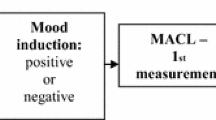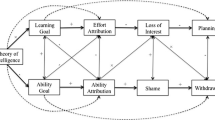Abstract
The present research examined the influence of induced mood on causal perception and goal expectancies for an achievement-oriented activity. Prior to the administration of a laboratory task, positive and negative moods were experimentally induced in student volunteers. It was found that elated subjects were initially more confident of success than subjects temporarily made to feel depressed. Furthermore, following the receipt of bogus success/failure feedback, individuals in a positive mood perceived the causes of success as more stable than subjects in a negative mood. In addition, the judgments of elated subjects appear to have been biased in a self-enhancing direction following success, but outcome had no effect on the causal attributions of subjects temporarily induced to feel depressed. The findings indicate that prevailing affective state is an important determinant of causal perception, and suggest that mood may play a central role in the accurate or biased perception of valenced outcomes.
Similar content being viewed by others
References
Abramson, L. Y., & Alloy, L. B. (1981). Depression, nondepression, and cognitive illusions: Reply to Schwartz.Journal of Experimental Psychology: General, 110 436–447.
Abramson, L. Y., Seligman, M. E. P., & Teasdale, J. D. (1978). Learned helplessness in humans: Critique and reformulation.Journal of Abnormal Psychology, 87 49–74.
Alloy, L. B., & Abramson, L. Y. (1979). Judgment of contingency in depressed and nondepressed students: Sadder but wiser?Journal of Experimental Psychology: General, 108 441–485.
Alloy, L. B., Abramson, L. Y., & Viscusi, D. (1981). Induced mood and the illusion of control.Journal of Personality and Social Psychology, 41 1129–1140.
Beck, A. T. (1967).Depression: Clinical, experimental, and theoretical aspects. New York: Harper & Row.
Bower, G. H. (1981). Mood and memory.American Psychologist, 36 129–148.
Brown, J., & Taylor, S. E. (1984).Affect and the processing of personal information. Manuscript submitted for publication.
Brown, J., & Weiner, B. (1984). Affective consequences of ability versus effort: Controversies, resolutions, and quandaries.Journal of Educational Psychology, 76 146–158.
Coyne, J. C., & Gotlib, I. H. (1983). The role of cognition in depression: A critical appraisal.Psychological Bulletin, 94 472–505.
Feather, N. T., & Simon, J. G. (1971a). Causal attributions for success and failure in relation to expectations of success based on selective or manipulative control.Journal of Personality, 39 527–544.
Feather, N. T., & Simon, J. G. (1971b). Attribution of responsibility and valence of outcome in relation to initial confidence and success and failure for self and other.Journal of Personality and Social Psychology, 18 173–188.
Frost, R. O., & Green, M. L. (1982). Velten mood induction procedure effects: Duration and post-experimental removal.Personality and Social Psychology Bulletin, 8 341–347.
Garber, J., & Hollon, S. D. (1980). Universal versus personal helplessness in depression. Belief in uncontrollability or incompetence?Journal of Abnormal Psychology, 89 56–66.
Goodwin, A. M., & Williams, J. M. G. (1982). Mood induction research: Its implications for clinical depression.Behavior Research and Therapy, 20 373–382.
Klein, D. C., Fencil-Morse, E., & Seligman, M. E. P. (1976). Learned helplessness, depression, and the attribution of failure.Journal of Personality and Social Psychology, 33 508–516.
Kuiper, N. A., & MacDonald, M. R. (1982). Self and other perception in mild depressives.Social Cognition, 1 223–239.
Lazarus, R. S. (1984). On the primacy of cognition.American Psychologist, 39 124–129.
Levine, M. (1966). Hypothesis behavior by humans during discrimination learning.Journal of Experimental Psychology, 71 331–338.
Mukherji, B. R., Abramson, L. Y., & Martin, D. J. (1982). Induced depressive mood and attributional patterns.Cognitive Therapy and Research, 6 15–21.
Peterson, C., & Seligman, M. E. P. (1984). Causal explanations as a risk factor for depression. Theory and evidence.Psychological Review, 91 347–374.
Ronis, D. L., Hansen, R. D., & O'Leary, V. E. (1983). Understanding the meaning of achievement attributions: A test of derived locus and stability scores.Journal of Personality and Social Psychology, 44 702–711.
Teasdale, J. D. (1983). Negative thinking in depression: Cause, effect, or reciprocal relationship? In L. Joyce-Moniz, F. Lowe, & P. Higson (Eds.),Theoretical issues in cognitive-behavioral therapy. New York: Plenum Press.
Teasdale, J. D., & Fogarty, S. J. (1979). Differential effects of induced mood on the retrieval of pleasant and unpleasant events from episodic memory.Journal of Abnormal Psychology, 88 248–257.
Velten, E. (1967).The induction of elation and depression through the reading of structured sets of mood-statements. Unpublished doctoral dissertation, University of Southern California.
Velten, E. (1968). A laboratory task for induction of mood states.Behavior Research and Therapy, 6 473–483.
Weiner, B. (1979). A theory of motivation for some classroom experiences.Journal of Educational Psychology, 71 3–25.
Weiner, B. (1982). The emotional consequences of causal ascriptions. In M. S. Clark & S. T. Fiske (Eds.),Affect and cognition (pp. 185–209). Hillsdale, New Jersey: Erlbaum.
Weiner, B. (1983). Some methodological pitfalls in attributional research.Journal of Educational Psychology, 75 530–543.
Weiner, B., Frieze, I. H., Kukla, A., Reed, L., Rest, S., & Rosenbaum, R. M. (1971).Perceiving the causes of success and failure. Morristown, New Jersey: General Learning Press.
Weiner, B., Russell, D., & Lerman, D. (1978). Affective consequences of causal ascriptions. In J. H. Harvey, W. J. Ickes, & F. R. Kidd (Eds.),New directions in attribution research (Vol. 2, pp. 59–90). Hillsdale, New Jersey: Erlbaum.
Weiner, B., Russell, D., & Lerman, D. (1979). The cognition-emotion process in achievement-related contexts.Journal of Personality and Social Psychology, 37 1211–1220.
Wright, J., & Mischel, W. (1982). Influence of affect on cognitive social learning person variables.Journal of Personality and Social Psychology, 43 901–914.
Zajonc, R. B. (1980). Feeling and thinking: Preferences need no inferences.American Psychologist, 35 151–175.
Zajonc, R. B. (1984). On the primacy of affect.American Psychologist, 39 117–123.
Author information
Authors and Affiliations
Additional information
The research reported in this article was supported by a Chancellor's Fellowship from UCLA to the author and by Grant #MH38014 to Bernard Weiner from the Public Health Service. I am grateful to Sandra Graham and Bernard Weiner for their many helpful suggestions, and to Anne Peplau and an anonymous reviewer for their perceptive comments on an earlier version of this paper. Appreciation is also expressed to the staff at the Center for Computer Based Research, UCLA, Gerald Shure, Director.
Rights and permissions
About this article
Cite this article
Brown, J. Effects of induced mood on causal attributions for success and failure. Motiv Emot 8, 343–353 (1984). https://doi.org/10.1007/BF00991872
Issue Date:
DOI: https://doi.org/10.1007/BF00991872




